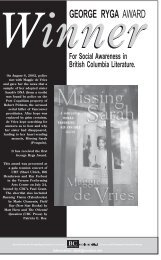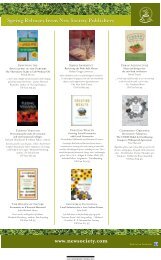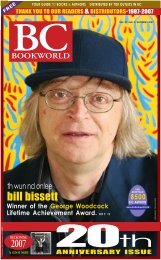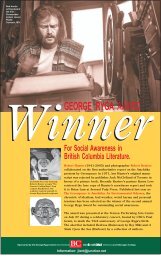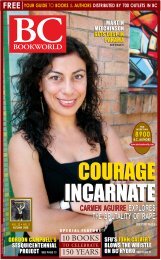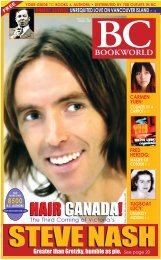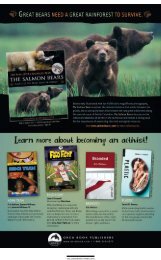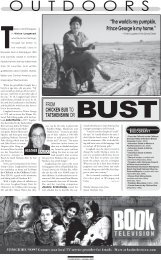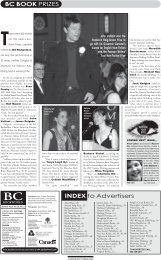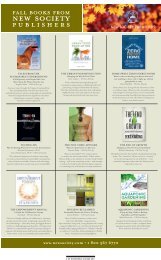BC letters - BC BookWorld
BC letters - BC BookWorld
BC letters - BC BookWorld
You also want an ePaper? Increase the reach of your titles
YUMPU automatically turns print PDFs into web optimized ePapers that Google loves.
9 <strong>BC</strong> BOOKWORLD SUMMER 2009<br />
W.O<br />
MITCHELL<br />
4<br />
ALTHOUGH HE WAS<br />
mostly recognized as a<br />
prairie author, W.O. Mitchell spent<br />
many summers at his family’s summer<br />
home at Mabel Lake, near Salmon Arm,<br />
B.C. where he and his wife Myrna<br />
Mitchell shared good times with their<br />
children and grandchildren.<br />
William Ormand Mitchell<br />
was born in Weyburn, Saskatchewan in<br />
1914 and died in Calgary in 1998. Most<br />
famously he wrote Who Has Seen the<br />
Wind (1947).<br />
W.O. Mitchell at Mabel Lake<br />
LEONARD<br />
COHEN<br />
5 AND HE SHOWED US<br />
where to look among the<br />
garbage and the flowers...The story goes<br />
that Dan McLeod and like-minded<br />
counter-culturalists decided to start a<br />
‘peace paper’ at a Vancouver party following<br />
a poetry reading by Leonard<br />
Cohen in February of 1967.<br />
The first organizational meeting was<br />
held at the home of Rick Kitaeff<br />
on March 30, 1967. This subsequently<br />
gave rise to a cooperatively managed<br />
newspaper called the Georgia Straight,<br />
25<br />
F A M O U S<br />
LITERARY<br />
VISITORS<br />
later controlled and owned by McLeod.<br />
The history is fuzzy, but certainly the<br />
newspaper had literary beginnings.<br />
Other poets involved in its creation included<br />
bill bissett—whose<br />
blewointmentpress printed a handbill<br />
advertising an open organizational meeting<br />
for April 2, 1967—as well as<br />
Pierre Coupey, Gerry Gilbert<br />
and Milton Acorn.<br />
6<br />
ARTHUR<br />
CONAN<br />
DOYLE<br />
DURING HIS FOURTH VISIT TO NORTH<br />
America in 1923 (following visits in<br />
1894, 1914 and 1922), Sir Arthur<br />
Conan Doyle, the creator of the rationalist-hero<br />
detective Sherlock<br />
Holmes, travelled across Canada and the<br />
U.S. to lecture on his favourite topic,<br />
Spiritualism. While travelling with his<br />
wife Lady Jean and their three children,<br />
Conan Doyle spoke in 15 cities across<br />
the U.S., as well as Vancouver.<br />
Conan Doyle’s visit to Vancouver is<br />
mentioned in Our Second American Adventure<br />
(1924). He offers the following<br />
analysis of the Komagata Maru Incident<br />
of May, 1914.<br />
“The whole incident seemed to me<br />
to be so grotesque—for<br />
why<br />
should sun-loving<br />
Hindoos<br />
force themselves<br />
upon Canada—<br />
that I was convinced<br />
some<br />
larger purpose<br />
lay behind it.<br />
Arthur Conan Doyle That purpose<br />
was, as we can<br />
8<br />
now see, to promote discord among the<br />
races under the British flag. There can<br />
be no doubt that it was German money<br />
that chartered that ship.”<br />
How Kiplingesque.<br />
Rabindranath Tagore in 1929,<br />
photographed by John Vanderpant<br />
7<br />
RABINDRANATH<br />
TAGORE<br />
THE FIRST PERSON FROM<br />
Asia to win the Nobel Prize for Literature,<br />
Sir Rabindranath Tagore<br />
(1861-1941) made four visits to North<br />
America and was photographed by Vancouver<br />
photographer John<br />
Vanderpant in 1929.<br />
During his final visit in 1940 the<br />
Hindu mystic, poet and educator was<br />
detained at the border by U.S. officials<br />
and cross-examined about the purpose<br />
of his visit. He telegraphed President<br />
Franklin Roosevelt from Vancouver<br />
but never received a reply. He<br />
cut short his visit and returned to India.<br />
Knighted in 1915, he resigned the<br />
honour in 1919 to protest repressive<br />
British measures in India. Among his<br />
many books is The Religion of Man.<br />
THEODORE<br />
ROOSEVELT<br />
WHILE NOT WIDELY RECognized<br />
today as a literary<br />
man, Theodore Roosevelt, the<br />
26th president of the United States,<br />
born in 1858, first rose to prominence<br />
as the 23-year-old author of The Naval<br />
War of 1812, hailed as a literary and<br />
scholarly triumph. Roosevelt rose to military<br />
prominence due to jingoistic newspaper<br />
reports that inflated the heroism<br />
of his Rough<br />
Riders regiment<br />
as they overcame<br />
outmanned,<br />
under-supplied<br />
Spanish opposition<br />
in Cuba in<br />
1898.<br />
W h e n<br />
Theodore Roosevelt<br />
Roosevelt visited<br />
Vancouver in<br />
1915, four years<br />
before he died, Mayor Louis<br />
Dennison Taylor outwitted his political<br />
foes by hopping on the train as it<br />
stopped in New Westminster. Taylor<br />
grabbed the spotlight upon Roosevelt’s<br />
arrival by escorting him around Stanley<br />
Park in his car.<br />
The man most famous for saying,<br />
“Speak softly, and carry a big stick; you<br />
will go far,” received the Nobel Peace<br />
Prize in 1906.<br />
DAVID BOSWELL PHOTO<br />
Leonard Cohen, on the<br />
Vancouver sea wall, 1978, is<br />
credited with inspiring the<br />
start of the Georgia Straight<br />
newspaper in 1967.



